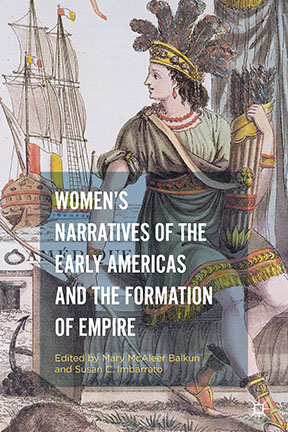Women’s Narratives of the Early Americas and the Formation of Empire - Seton Hall University
Thursday, March 17, 2016

The book, Women’s Narratives of the Early Americas and the Formation of Empire, is a collection of 16 essays from leading scholars that, as one reviewer noted, “documents how women, including servants and shop-keepers, mystics and midwives, captives and converts, loyalists and criminals, situated themselves in relation to their changing worlds and served as agents and adversaries of colonization.”
Professor Balkun is the editor of the compilation published by Palgrave Macmillan
along with Professor Susan C. Imbarrato of Minnesota State University Moorhead. Professor
Balkun, who is also Associate Editor of The Greenwood Encyclopedia of American Poets and Poetry, has noted in the preface to this, her most recent work, that the book on women and
empire came about through a session she organized and presented in at the 2012 American
Studies Association Conference titled “Freaks, Monsters, and Madwomen: Women’s Narratives
and the Formation of Empire,” and the realization that the topic of women’s role in
the formation of empire was essentially nonexistent in academic writing.
In the book’s Preface, Balkun and Imbarratto recount:
it became clear not only that there were a number of unexpected intersections between the papers [in the session] but also that they revealed significant gaps in our understanding of empire building in the early Americas.
Further analysis bore out that stark realization as the most significant “gap” in the scholarly telling of this crucial aspect of American and world history was the almost complete lack of women’s voices in the scholarly work to date. As noted by Professor Marion Rust of the University of Kentucky in her Introduction to Women’s Narratives of the Early Americas and the Formation of Empire,
As late as 2000, for instance, John Carlos Rowe was able to write an entire volume on the subject of Literary Culture and U.S. Imperialism: From the Revolution to World War II without listing a single female-authored text in the Table of Contents. Such works, he suggests, are synonymous with “sentimental and domestic” fiction, whose study is better left to other (coincidentally all-female) scholars. Some ten years later, the index to Mark Rifkin’s Manifesting America: The Imperial Construction of U.S. National Space continues in the same vein: it contains only five references under “gender” and two of those are endnotes. For more about gender, the index directs us to “masculinity.” In a field known for its progressivism, such neglect is disappointing.
With the work of Balkun and Imbarratto, the “neglect” of women’s voices in the academic telling of the rise to empire has been addressed — if not fully, seminally, and with a wide range of voices laying the groundwork for further study. As the two editors note in the book’s Preface,
Women’s Narratives of the Early Americas and the Formation of Empire examines the myriad connections between women’s experiences and the forces of empire to show how women’s assertions and protests contributed to the development of the Americas and the United States in particular. The sixteen essays in this collection describe acts of bravery, protest, and survival, from a twelfth-century Icelandic explorer and colonizer to a seventeenth-century Basque woman who escaped from a convent to an eighteenth-century convicted felon to an early nineteenth-century Cherokee convert. The texts studied represent a variety of genres, including sagas, letters, diaries, captivity narratives, travel narratives, sentimental novels, autobiographies, and poetry. The concluding essay examines theories of anthology selection from the late nineteenth century to the present to illustrate how women’s writings have been variously included and excluded and the implications.
Women’s Narratives of the Early Americas and the Formation of Empire is available through Palgrave Macmillan and other booksellers.






